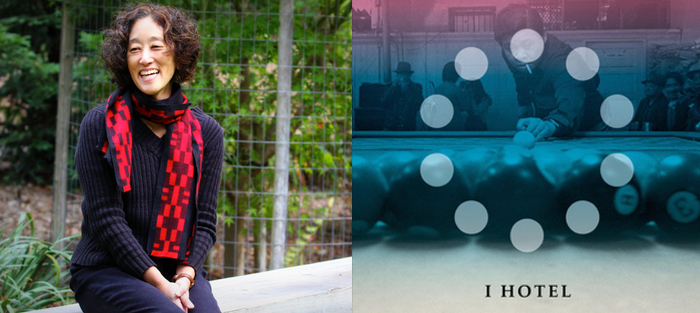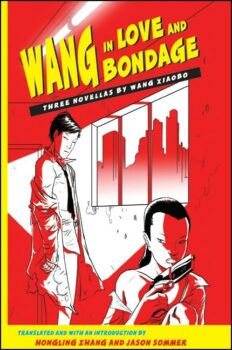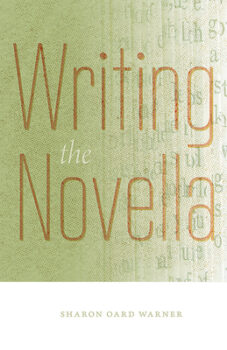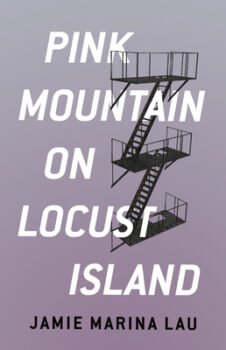Shortlisted for the National Book Award in 2010, author Karen Tei Yamashita’s most recent book, I Hotel (Coffee House Press), consists of ten interlinking novellas which detail the rise and fall of San Francisco’s (in)famous, single-room-occupancy International Hotel from the years 1968 (the time of the student riots at SF State and Berkeley), to 1977 (when the hotel was torn down to make way for gentrification), mainly by charting the personal histories of the numerous, disparate characters who all found themselves deliberately or suddenly politicized by their attempts to save it. For those unaware, the late 1960s and 1970s span the apex of the Yellow Power movement, which not only helped to establish Ethnic Studies as a legitimate academic field, but also unified American-born descendants of Asia’s various ethnicities under one collective term that we still use today: Asian American. And because of the vast number of different ethnic, social, and political groups once housed in its basement, the International Hotel is as important an institution to Asian American culture and Yellow Power as HBCUs [Historically Black Colleges and Universities] are to African Americans.
Populated by influential, historical figures of the period whose speeches and words are sometimes transcribed verbatim, alongside completely made-up characters whose language seems no less real, I Hotel is a careful, considerate blend of fact and fiction, parody and pastiche; the book contains so many allusions to the people, places, and things that comprised one of America’s most transformational times that it bears comparisons to such canonical works as John Dos Passos’ U.S.A. trilogy, and, in many ways, deserves to be called an encyclopedic text.
The author of four previous novels and a number of plays, Yamashita is an Associate Professor of Literature at UC Santa Cruz, where she teaches creative writing and Asian American literature. While I presumably met her to talk solely about I Hotel, our conversation quickly became wide-ranging, addressing everything from the role of history and memory to the process of writing, to what one’s politics and culture says about the nature of storytelling itself. What follows is a portion of an extended conversation with Yamashita.
Interview:
Rone Shavers: Let’s start with the politics of I Hotel, which are really kind of interesting. First things first, there’s the difference between politics and political ideology. There are all sorts of politically committed people in the novel, but the most committed characters are also the ones who have the most angst, and are always challenged by the other characters. I was wondering if you were trying to say anything specific about politics, or even just ideology. Does the novel have a political stance?
Karen Tei Yamashita: Well, I wanted to recreate the kinds of discussions that were going on at the time. They were more than discussions, really. They were arguments. There were hostilities that were being created out of different ideological trajectories from the knowledge that was being learned and formed. Here are these politically active but also really intelligent people, who were theorizing about things and trying to put their thinking into practice, coming up against these problems and having to argue them out again. These are the kinds of struggles that were going on at the same time that people were trying to work through these issues on the ground. It was mostly just trying to put those problems into the mouths of the characters in order to make them available to us. I knew that these kinds of problems were coming up, but how to show it? That was what I was more interested in doing. I think that the inability to resolve some of these questions, or to resolve them without the kind of passionate anger that people had—to the point of physically beating each other up—was part of the problem. It was partly because people were young and couldn’t talk to each other, so those difficulties probably destroyed any kind of forward momentum.
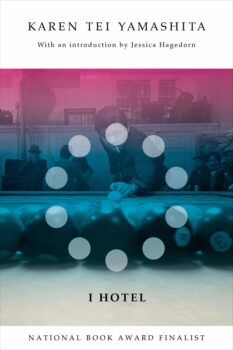 I would say I was also looking for what one would do if one were trying to educate a group of people about the difficulties any group might have as they pursue a course of action. You know, “These are the kind of things that may or will happen, so then what will you do?” It’s instructive in that way. But I was also trying to think about why things didn’t work out, and they were built into these kinds of problems. Lots of the problems were issues of class; do you know what I mean? If they were studying with Marxist theorists—there were a lot in the universities—their jargon and their means of talking about what they should do or how one should think was so difficult that I can’t imagine it was easily ingested. There was no way to say things in simple terms that other people could understand.
I would say I was also looking for what one would do if one were trying to educate a group of people about the difficulties any group might have as they pursue a course of action. You know, “These are the kind of things that may or will happen, so then what will you do?” It’s instructive in that way. But I was also trying to think about why things didn’t work out, and they were built into these kinds of problems. Lots of the problems were issues of class; do you know what I mean? If they were studying with Marxist theorists—there were a lot in the universities—their jargon and their means of talking about what they should do or how one should think was so difficult that I can’t imagine it was easily ingested. There was no way to say things in simple terms that other people could understand.
You have all of these different narrative forms in the book, why did you choose so many? What could multiple literary forms do that a conventional narrative couldn’t?
Because I thought there were too many points of view, there were too many trajectories and groups and movements that were happening simultaneously. I thought having multiple forms would be the most kaleidoscopic way to present the material. I was looking at Asian-American literature and I was looking at it from the cultural centers, and I was trying to think, “What narratives seem to be closest to a Japanese-American? What’s a Japanese-American narrative, and why?” That’s exactly what I was trying to think about.
Is that the big, inherent question of I Hotel? Or was that its impetus?
That was one of my questions, so the book is as much a…maybe it’s partly a satire or a parody of what I thought might be those kinds of narratives. For example, what kinds of narrative strategies will be reproduced again and again by Chinese-Americans? You constantly see a particular narrative form and you wonder, “So, if that’s a way someone tells a story, how will they act? How do they see their history and how they tell stories? How do they justify what they do?” I just noticed it. I don’t have a criticism one way or another about it; I think it’s a way of telling a story.
There’s another historical thing: I was really struck by your attention to history but not very well-known historical facts, like Captain Jack, for example. I’d never heard of him before. If you’re parodying commonplace cultural narratives, does the novel then function as a counter-narrative, or is it just an addition to those other narratives? Are you trying to carve more room into, say, the grand American narrative?
What I was trying to do was to find these intersections with—in this case—the Japanese-American internment and the Native Americans who occupied the same land, who were both incarcerated on their own lands. Well, one on their own land, the other on land that they were forced to live on. When I started to look at Tule Lake [a detainment camp for persons of Japanese descent that opened in 1942 and remained in operation until 1946, with a peak population of nearly 19,000, making it the largest of the internment camps] and that whole area, I went back to look at the history of who had actually lived there, and that’s when I found out about the Modoc War [an armed conflict that took place from 1872 to 1873 in northern California and southern Oregon between the U.S. Army and the Native American Modoc tribe]. But what was really interesting was that the two Native Americans who were removed from the conflict were sent to Alcatraz. So I went to visit Tule Lake. I was reading all this stuff and I started to get more information, and when I realized that those two Native Americans were sent to Alcatraz, I knew that I had the means to connect all of this. I used them as two men who had died in prison there, whose ghosts still occupied Alcatraz. I don’t know whether Native Americans themselves know this story, but I was fascinated with it.
The “I-Migrant Hotel” section is narrated by Felix, the old-school Pinoy migrant worker. Is that a recording, or did you do that on your own?
Oh, the voice? No, I just created it.
Really? The rhythms and the language pattern and everything else?
No, it’s entirely constructed. When I was listening to those guys in the old films and audiotapes I was kind of hearing this…you know, when I read it, I have to apologize. I’m impersonating them but it’s a construct that I created out of all of these voices. It’s been interesting to have to read it, because I needed certain things in there so that you can tell where the dialogue breaks. It’s mostly to do that. As you read it on the page, there’s a cadence that’s set up to be there on the page. And yet I didn’t want to patronize the language.
 But that’s why I asked about your use of history earlier, because you do have audiotaped transcriptions in the novel. Yet at the same time you’re constructing these characters and these voices. It’s hard to differentiate between the two. Was that part of your intention?
But that’s why I asked about your use of history earlier, because you do have audiotaped transcriptions in the novel. Yet at the same time you’re constructing these characters and these voices. It’s hard to differentiate between the two. Was that part of your intention?
I feel it’s transparent. You might not be able to tell, but if you asked me, I’d tell you exactly where the tape starts and where it ends, where it’s verbatim, what’s constructed and what’s not, what story was told to me and what parts of it were not. I have no problem revealing anything about it. I don’t worry about that.
My question, then, is why not construct everything, which is what most fictional works do?
No, they don’t. That’s a lie. If they’re saying that they’re lying. Where are they getting their material? I think writers do more or less research. Some do less because it’s not in the purview of the material. It doesn’t require that kind of contextualization. This novel did because it’s part of a time that people… Even if I heard a story, I had to take the story and put it back in this space. In order to know what that space was I had to figure out everything else about it.
Then why include things verbatim? In general, I find the way you tend to include a lot of verbatim things to be really good. It’s productive. I’m just curious as to…
Why do it?
Yes, because then the whole kind of thing is—well, I wonder, what’s the line between what really happened and what’s just a reconstruction?
It’s a reconstruction. All of it, I guess. [Laughter.] I lied about whatever happened in between. I don’t know. You’re the scholar; you’re supposed to tell me. You’re supposed to say, “Okay, this is why this is really dicey…”
I think reconstruction is a good word for it, because in almost all of the stories, you’re kind of reconstructing history…here’s another thing, then: what’s the role of Feminism in your work? Is there an articulated Feminist stance there?
One of things that was really interesting in interviewing women of the period were just their stories about how they became transformed, their feelings about their role in the movement. In the beginning their roles were pretty marginal and they knew it, but they really changed the movement. They made it different, because many of these women went on to take on the organizations. They became the leaders of their organizations. That became really evident; that having the women in leadership roles was going to be the future. The guys had not known that they would be displaced. Yeah, Feminism is in there, those narratives are there, but at the same time, there are counter-narratives in there, too. The narrative voice that’s telling this narrative is not necessarily a Feminist one.
Well, then, how to read the ending of the book? Because it ends with a sort of “We’re here” statement. But that here is 1977. How would you interpret it?
That’s the weird thing about fiction. It’s just that weird thing, isn’t it? It’s this weird thing about the process of recuperating all these stories you hear. But they’re memories, and they’re memories told to me twenty or thirty years later, depending on when I heard them. Some of them are exaggerated, some memories are truthful, some are not, and then I’m totally screening the whole thing. So…I don’t know what it is. It’s a great lie and it’s a great truth. Everyone who wants to talk about the period is also trying to figure out what the hell they did. Why did they make those sacrifices? Why did they give it all up? Why are they laughing at themselves at this period of time? What really hurt? What was it they could never tell me that I had to figure out why they couldn’t? Why was it so painful and how does it get in there? I don’t know….
Could you talk about your treatment of time and space in I Hotel? What are challenges to character and characterization, character delineation, all these sorts of things when you move through time and space? Why do it?
Well, I think of the book as being layered in time. When I first structured the book, every novella was going to have ten chapters, and every chapter was going to be part of a year. It was going to be layered on top of each other so that we would have…
Like the floors of a hotel.
Like that. But when I started to write it, it didn’t work. So then I tried to think about it in different ways. I thought, “Okay, if it says 1974 on one of the novellas, that’s the key year…” I used that as a key year. But my rule was that I could go back and forth. The rule was that I could go back in time to before 1968—because the Internment happened before, I could go back to World War Two—but the rule was that I would never go past ’77. The only time where I screw with that rule is with Maxine Hong Kingston and Frank Chin, because they’re old now. They were not old at the time. I just let them move on into the future, but they’re the only people I let that happen to, everybody else stops at ’77. So I just made these rules for the book because I knew that the past had consequences for the characters’ present-day 1977, but I didn’t want to postulate anything. It’s suggested that things will change radically, you know? Because we know that after the Vietnam war ends in 1975, all these new Vietnamese, Cambodian, and Southeast Asian refugees will come in. We also know that because of changes to family rules and immigration laws, there will be a huge influx of people from China, so Chinatown is going to suddenly burst at the seams. These are all the things that nobody can foresee, so their activism cannot provide for this.
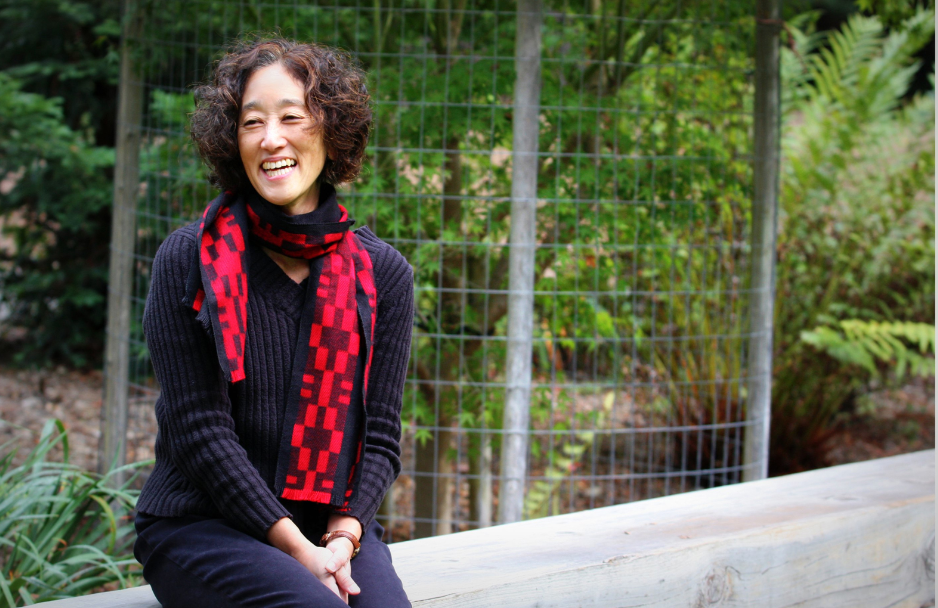 When I started writing the novel I realized that certain kinds of narrative structures don’t allow for…it’s not about it being chronological. I went back to some of the old rules of Magic Realism. In Magic Realism, even though it’s told realistically, the rules about chronological time sort of change. Also, when storytelling, people are always sort of dipping into the past and then moving forward, dipping into the past and coming forward, so that sort of changed. I was also trying to think also about how all the people who are living at the same time are influenced by things and events in ways that might be unique or unexpected, so that if one could read all this material again and look at it, something that was happening in Africa with Lumumba, how does it play out here?
When I started writing the novel I realized that certain kinds of narrative structures don’t allow for…it’s not about it being chronological. I went back to some of the old rules of Magic Realism. In Magic Realism, even though it’s told realistically, the rules about chronological time sort of change. Also, when storytelling, people are always sort of dipping into the past and then moving forward, dipping into the past and coming forward, so that sort of changed. I was also trying to think also about how all the people who are living at the same time are influenced by things and events in ways that might be unique or unexpected, so that if one could read all this material again and look at it, something that was happening in Africa with Lumumba, how does it play out here?
Right, like how does something that’s happened in Thailand effect the Pinoy (Filipino) community in San Francisco? That’s explicit in the book.
Right. For instance, the guy who comes to own the I Hotel, he’s from Thailand, but the reason why he’s buying out Chinatown is because he has to leave Thailand, because Thailand is under revolt. So yeah, all these things are happening simultaneously. I wanted to be internationally synchronous, not just synchronous across Asian America. I also wanted to be synchronous between ethnicities. I constantly had to look up at what was happening in the United States at the time, what people thought was a national problem.
Okay, last question. I’m really struck by one thing you said, and that was that the characters have to deal with the influences of events and situations which their politics haven’t prepared them for. Once again, we get back to the issue of the failure of well-defined political positions. That’s why I asked the question I did. What’s the political theme or meaning here, what’s really going on? How to define the politics of the novel?
What I wanted to say is that all of these things were personal to people, that they felt it in their skin. They knew these things had happened to themselves and their families—it was personal for them when they started—but then it became something much larger than themselves, and that’s why young students could suddenly have a way of leaving their homes to do something. There was a purpose. When you think about how things work in cities among impoverished people, it has to begin with seeing your own situation and knowing what that is, then being able to analyze things and say, “Okay, yeah, now I get it.” But if you don’t get it, then what do you do? Some people never get it, that’s all I’ve been reading about, right? You read about it in fiction all the time. Some never get it, so there’s no path out of their predicament. It starts there: How do we break out? That’s the politics of it. I want to know, how come some people can fall on one side and some people can fall on the other? Maybe we let them fall because they’re expendable. I don’t think that’s the politics I want to follow. I don’t believe in that. I think literature is fascinating, but I don’t think it’s the only puzzle out there.

